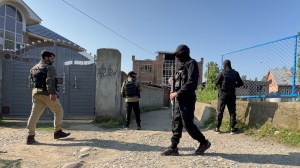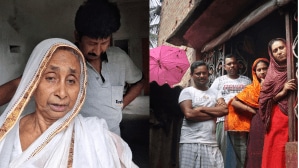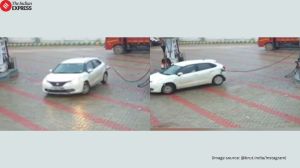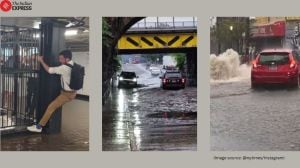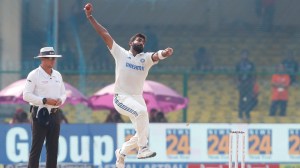UPSC Key- 10 July, 2023: What you should read in the news today
Exclusive for Subscribers from Monday to Friday: Have you ever thought about how the torrential rain or urban water-logging or dual role of Governor are relevant to the UPSC Exam? What significance do topics like Alauddin Khilji, electric vehicles and age of consent have for both the preliminary and main exams? You can learn more by reading the Indian Express UPSC Key for July 10, 2023.
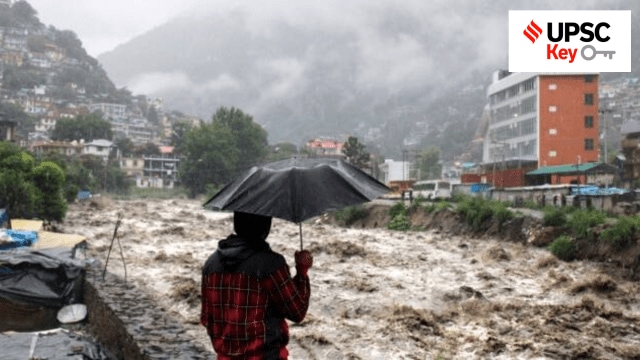 UPSC Key July 2023: Here's what you should be reading from the July 10, 2023 edition of The Indian Express.
UPSC Key July 2023: Here's what you should be reading from the July 10, 2023 edition of The Indian Express. Important topics and their relevance in UPSC CSE exam for July 10, 2023. If you missed the July 7, 2023 UPSC key from the Indian Express, read it here
FRONT PAGE
Rain brings North to its knees: 15 dead, highways blocked, swathes flooded
Syllabus:
Preliminary Examination: General issues on Environmental ecology, Bio-diversity and Climate Change
Mains Examination:
• General Studies I: Urbanisation, their problems and their remedies.
• General Studies I: Important Geophysical phenomena such as earthquakes, Tsunami, Volcanic activity, cyclone etc., geographical features and their location-changes in critical geographical features (including water-bodies and ice-caps) and in flora and fauna and the effects of such changes.
Key Points to Ponder:
• What’s the ongoing story- Incessant rainfall over the weekend brought north India to its knees, with rivers in spate, landslides in the mountains, waterlogging in the plains, and 15 dead in rain-related incidents. In Uttarakhand’s Udham Singh Nagar, at least two persons died after parts of two houses collapsed, while a jeep carrying 11 pilgrims from Kedarnath fell into the river Ganga in the Muni ki Reti area of Tehri Garhwal district around 3 am. Three of the passengers have died, and five are injured. The State Disaster Response Force teams are running a search operation for the other three missing people. Five people were killed in Himachal Pradesh – a family lost three members when debris fell on their house in the village of Panevalli, Kotgarh, while landslides claimed the lives of a woman in Lankadbeer village, Kullu, and an individual in Kakkiyan, Chamba. In Jammu and Kashmir, the bodies of two soldiers who drowned in Poonch were recovered.
• Do You Know-After the Uttarakhand disaster of 2013, there has not been a single year when India has not had at least one major extreme rainfall event, one that resulted in large-scale flooding, destruction and, in most cases, loss of lives. Such events have happened in Kashmir, Chennai, Bengaluru, Pune, Mumbai, Gurgaon, Kerala, Assam, Bihar and many other places.
• Why scientists have been warning for several years now?
• ‘In most cases, there is an aggravating factor involved, comprising official incompetence, neglect, callousness and, often, greed’-Discuss
• Why Bengaluru gets flooded every year?
• Why Srinagar faced unprecedented flooding in 2014?
• The India Meteorological Department attributed the heavy rainfall to what?
• Interaction of a western disturbance and monsoonal winds-what have you understood by this?
• For Your Information-The India Meteorological Department attributed the heavy rainfall to the interaction of a western disturbance and monsoonal winds. Mrutyunjay Mohapatra, Director General, IMD, said, “This happens because of large-scale systems. We had good monsoon circulation, and at the same time a western disturbance was passing over the region. So, we had strong westerly winds, along with moist easterly winds from the Bay of Bengal, resulting in convergence of these two types of winds over northwest India.”
• Rainfall shattered records in both Delhi and Chandigarh, with waterlogging across the two cities-What does water-logging mean?
• There are different types of water logging that happen due to different conditions in an area-What are they?
• What are the causes of urban water-logging?
• Water-logging is a prelude to urban flooding-Do you agree with this?
• Issues related to urban stormwater management
• What do you understand by “Concretisation”?
• ‘Concretisation’ a by-product of urbanisation which has almost engulfed major cities in India-know it’s impact?
• ‘Concretisation’ and water logging-Connect the dots
• ‘Concretisation’ is turning the city into an urban heat island with threats of water logging and urban floods in metro cities”-how far you agree with this statement?
• What is torrential rain?
• What causes the torrential rain?
• What is the difference between torrential rain and heavy rain?
• “Each of these events in the last 10 years has served a warning, and each of them has offered a number of learnings. Unfortunately, very few lessons, if any, seem to have been learnt”-what Lessons India has learnt from all these disasters?
Other Important Articles Covering the same topic:
📍Since 2013, ‘extreme’ events each yr but few lessons learnt
📍Delhi breaks 41-yr rainfall record, city waterlogged again
📍Torrential rain wreaks havoc in Himachal
Stalin urges President to remove Ravi as Governor: ‘Inciting hate’
Syllabus:
Preliminary Examination: Indian Polity and Governance-Constitution, Political System, Panchayati Raj, Public Policy, Rights Issues, etc.
Mains Examination: General Studies II: Appointment to various Constitutional posts, powers, functions and responsibilities of various Constitutional Bodies.
Key Points to Ponder:
• What’s the ongoing story- Tamil Nadu Chief Minister M K Stalin has written to President Droupadi Murmu accusing Governor R N Ravi of inciting “communal hatred” and labelling him a “threat to peace in the state”. “Sitting in the state capital and looking for an opportunity to overthrow the state government, the Governor can only be considered as an agent of the Union and such action of the Governor will destroy our federal philosophy and destroy the basic principles of Indian democracy, Tamil Nadu Governor … R N Ravi himself has outlined a good example of such a Governor. The Governor took the oath under Article 159 to protect the Constitution and the law and dedicate himself to the service and welfare of the people of Tamil Nadu. Chief Minister said it was clear that Ravi had transgressed and incited communal hatred and is a threat to peace in the state,” read a government statement on the CM’s letter issued on Sunday. The letter is dated July 8.
• How is the Governor of a state appointed?
• “Governor” is neither a decorative emblem nor a glorified cipher. His powers are limited but he has an important constitutional role to play in the governance of the state and in strengthening federalism-Analyse the role of the Governor
• What has the Supreme Court said about the Governor’s role and power?
• It has been often argued that the Governor acts more as ‘an agent of the centre’-How far you agree with this statement?
• What is the relationship between the Governor and the state government?
• For Your Information-Right from Shamsher Singh’s case in 1974, authored by seven judges of the Supreme Court, and subsequently in S R Bommai (1994) and Shivraj Singh Chouhan (2020), the law is that in this and other matters, the governor must act on the aid and advice of the Council of Ministers. There are some exceptions which are not relevant here. Appointing and dismissing a minister is the prerogative of the chief minister.
• Articles 153 to 167 in Part VI of the Constitution deal with the state executive. The state executive consists of what?
• The office of governor has a dual role-Elaborate
• The Constitution does not lay down any grounds upon which a governor may be removed by the President-True or False?
Other Important Articles Covering the same topic:
📍Express View on Tamil Nadu Governor RN Ravi dismissing a minister: Fraying the fabric
📍Despite Supreme Court’s caution on a Governor’s role, Ravi tests the limits
THE CITY
Siri Fort: How a Khilji-era bastion against Mongol invaders became synonymous with 1982 Asian Games
Syllabus:
Preliminary Examination: History of India and Indian National Movement.
Main Examination: General Studies I: Indian culture will cover the salient aspects of Art Forms, literature and Architecture from ancient to modern times.
Key Points to Ponder:
• What’s the ongoing story- Dotted by historical ruins, nothing about Siri Fort now betrays that it was once a bastion of the Delhi Sultanate to defend the city from the onslaught of the Mongols. Located in the heart of the capital, Siri is the second among the seven cities of Delhi and the first to be built by a Muslim ruler — Alauddin Khilji.
• Know about Siri Fort
• For Your Information-“Siri Fort stands among the numerous monuments and palaces which Ala-ud-din had constructed. Built in 1311 AD, the fort served as a seat of Ala-ud-din’s administration. Among a host of administrative buildings and palaces, the construction, which deserves most credit was the Hazar Sutun, a magnificent palace comprising one thousand pillars. Housed within Siri, was Hauz-e-Alai, a marvellous reservoir…” writes Rajiv Tiwari in his book Delhi: A Travel Guide. According to the book, when Khilji ascended the throne in 1296 AD, he found his empire the target of foreign attacks and thus, Siri was constructed with the motive to fortify his kingdom.
• The glory of Siri at its prime has also been acknowledged by Timurlane — the Mongol ruler who invaded Delhi in the 14th century-Know more in detail
• Who was the Alauddin Khilji?
• Alauddin Khilji’s agrarian and market reforms in the context to meet the threat of recurrent Mongol invasions-know about his agrarian and market reforms in detail
• What made Alauddin Khilji famous?
• Mongol invaders and Alauddin Khilji-Connect the dots
Other Important Articles Covering the same topic:
📍Herein lies a king: A day in the life of Alauddin Khilji’s tomb
📍India Should Be Grateful to Alauddin Khilji for Thwarting the Mongol Invasions
EXPLAINED
Delhi HC rejects PepsiCo’s appeal over potato patent: What is the case
Syllabus:
Preliminary Examination: Current events of national and international importance.
Main Examination: General Studies III: Awareness in the fields of IT, Space, Computers, robotics, nanotechnology, bio-technology and issues relating to intellectual property rights.
Key Points to Ponder:
• What’s the ongoing story- The Delhi High Court last week upheld an order by the Protection of Plant Varieties and Farmers’ Rights Authority (PPVFRA), revoking the intellectual property protection granted to PepsiCo India Holdings Pvt. Ltd with respect to a potato variety developed by it.
• What is the case about?
• For Your Information-It pertains to FL 2027, a potato variety with high dry matter and low sugar content better suited for making chips. Normal table potatoes have more moisture, which adds to dehydration and energy costs during processing, and higher sugar, which causes blackening on frying. FL 2027 was developed in 1996 by Robert W Hoopes, a US breeder employed with Frito-Lay Agricultural Research, a division of PepsiCo Inc. The latter has been manufacturing potato chips sold under its Lay’s brand using this processing-grade variety, which is grown by some 14,000 farmers in India via contract cultivation and buy-back at pre-fixed rates. PepsiCo India Holdings, the subsidiary of the US food, snack and beverage giant, was granted a certificate of registration for FL 2027 as an “extant variety” on February 1, 2016. The validity period – during which nobody else could commercially produce, sell, market, distribute, import or export it without the breeder’s authorisation – was six years from the date of registration and extendable up to 15 years.
• What changed after that?
• Why was the registration revoked?
• Will this ruling impact investor confidence in India’s IP regime for protection of plant varieties and breeder’s rights?
Other Important Articles Covering the same topic:
📍Pepsi vs Gujarat farmers: case, its withdrawal
Syllabus:
Preliminary Examination: Economic and Social Development
Mains Examination: General Studies III: Infrastructure: Energy, Ports, Roads, Airports, Railways etc.
Key Points to Ponder:
• What’s the ongoing story- Mr Bean knows his cars. So, when Rowan Atkinson, a student of electronics engineering and self-confessed car nut (he once featured in Top Gear’s ‘Star in a Reasonably Priced Car’ segment) wrote a provocative piece in The Guardian titled, ‘I love electric vehicles — and was an early adopter, but increasingly feel duped’, it set off a slugfest between the petrolheads and EV evangelists.
• What do you understand by ‘Electric Vehicle’? How it is different?
• What are the types of electric vehicles?
• What are the issues in BEV push?
• Know these terms-Battery Electric Vehicle, Hybrid Vehicle, Plug-In Hybrid Vehicle and Fuel Cell Vehicle
• Electric Vehicles Scope in India-Know in detail
• Electric Vehicles in daily use-will be successful in Long run?
• Why Government of India is Pushing for adaptation of Electric Vehicles?
• Electric Vehicles-What are the issues and Challenges especially in India’s Scenario?
• India’s Commitment to reduce Carbon Emission like recent advocacy of five elements for climate change- “Panchamrit” at the COP26 in Glasgow
• Transition to electric mobility- pros and cons
• Various Government measures such as remodelled Faster Adoption and Manufacturing of Electric Vehicles (FAME II) scheme for the consumer side to production-linked incentive (PLI) scheme for Advanced Chemistry Cell (ACC)
Other Important Articles Covering the same topic:
📍India’s electric vehicle push will lead to brighter, greener future
THE EDITORIAL PAGE
Syllabus:
Preliminary Examination: Economic and Social Development-Sustainable Development, Poverty, Inclusion, Demographics, Social Sector Initiatives, etc.
Main Examination: General Studies III: Indian Economy and issues relating to planning, mobilization, of resources, growth, development and employment.
Key Points to Ponder:
• What’s the ongoing story-Ashok Gulati, Purvi Thangaraj write: Let us first start with the good news. As per the Indian Meteorological Department (IMD), the monsoon rainfall momentum has picked up in India, and the overall deficiency of rainfall in June (1 to 29) has reduced to 5 per cent compared to its Long Period Average (LPA).
• The IMD has also predicted that the July rainfall will be normal and so would be overall rainfall for the monsoon season (June to September). But there is something to worry about. What is that?
• What is the relation between El Nino and Indian droughts?
• How much damage can they do to Indian agricultural production, and thus food prices?
• What preemptive policy measures that can be taken at this stage?
• For Your Information-It may be noted that of the 15 droughts since 1950, three droughts years — 1965, 1979, and 2002 — have been the most damaging in terms of percentage drop in foodgrain production (19 per cent, 16.8 per cent, and 17.9 per cent, respectively) over the previous years. But the 2002 drought saw the maximum fall in absolute amount of foodgrain production by as much as 38 million tonnes (MT). If India had gone to the world markets to import 38 MT of foodgrains, one can imagine how global prices would have reacted. However, the subsequent droughts have been much milder. On the policy front, the government has been pro-active in taming food prices. Wheat exports have been banned and now stocking limits have also been imposed on traders and processors of wheat. Rice exports have attracted export duty of 20 percent on common rice. Most of pulses have also been under export controls/restrictions and stocking limits. Lately, the government has also been undertaking open market operations in wheat and rice with a view to bring down cereal inflation, which is still hovering in double digits. Aggressive open market sales of wheat by the government to the tune of about 3.4 MT just before wheat procurement season began in April helped bring down wheat wholesale prices substantially. That, in turn, enabled the government to procure 26MT of wheat.
• Why some of the vegetable prices are getting totally out of control?
• Government’s “Operation Green”, which started off with tomatoes, onions and potatoes (TOP) and extended to other vegetables, has not delivered in taming prices of TOP- What is Government’s “Operation Green”?
Other Important Articles Covering the same topic:
📍ExplainSpeaking: Monsoon 2023 starts with a deficit: What is the likely impact?
ECONOMY
Data protection Bill may lower age of consent, ease related norms
Syllabus:
Preliminary Examination: Current events of national and international importance
Main Examination: General Studies II: Government policies and interventions for development in various sectors and issues arising out of their design and implementation.
Key Points to Ponder:
• What’s the ongoing story- The upcoming data protection Bill could empower the central government to lower the age of consent from 18, and also exempt certain companies from adhering to additional obligations for protecting kids’ privacy if they can process their data in a “verifiably safe” manner, The Indian Express has learnt.
• What is the age of consent in India?
• Do children have right to privacy in India?
• For Your Information-The change is a major departure from the draft Digital Data Protection Bill, 2022 that was floated last November, under which the age of consent was hardcoded at 18 years – meaning that for processing data of individuals below the age of 18, companies were required to seek their parents’ consent. The upcoming Bill, it is understood, will take a graded approach to defining the age of consent on a case-by-case basis.
• What is the definition of a child under the data protection bill?
• Do You Know-Under the European Union’s General Data Protection Regulation (GDPR), age of consent has been kept at 16, but it allows member states to lower it to as much as 13. The United States’ Children’s Online Privacy Protection Act (COPPA) has capped the age of consent at 13, and verifiable parental consent is needed only for those who are younger. Other key changes to the upcoming Bill include further relaxations to cross-border data flows to international jurisdictions – by moving away from a whitelisting approach, to a blacklisting mechanism, as reported earlier by this newspaper.
• Why does data matter?
• What is Data Protection?
• What is personal data?
• What is non-personal data?
• Personal data and Non-personal data-compare
• The government withdrew the earlier Personal Data Protection Bill from Parliament. Why did the Government withdrawn the Personal Data Protection Bill?
• Joint Committee of Parliament Report on the Personal Data Protection Bill-Know key highlights
• Supreme Court on Right to Privacy (Justice K.S. Puttaswamy vs. Union of India, 2017)-know the verdict
• Justice B N Srikrishna committee recommendation on Data Protection-Know key recommendations
• Personal Data Protection Bill 2019- how this Bill propose to regulate data transfer?
• Key features of Personal Data Protection Bill 2019-know in brief
• What is data localisation? Know the Case for Data Localisation in India.
• What Srikrishna Committee Report says on data localisation?
• Initiative/steps taken by Government of India for Data Protection and Data Privacy-Know in detail
• What is the role of the Data Protection Board as per the revamped version of the Data Protection Bill?
Other Important Articles Covering the same topic:
📍Explained: The issues, debate around Data Protection Bill
📍What Data Protection Bill needs to do to actually protect
For any queries and feedback, contact priya.shukla@indianexpress.com
The Indian Express UPSC Hub is now on Telegram. Click here to join our channel and stay updated with the latest Updates.
Photos



- 01
- 02
- 03
- 04
- 05









